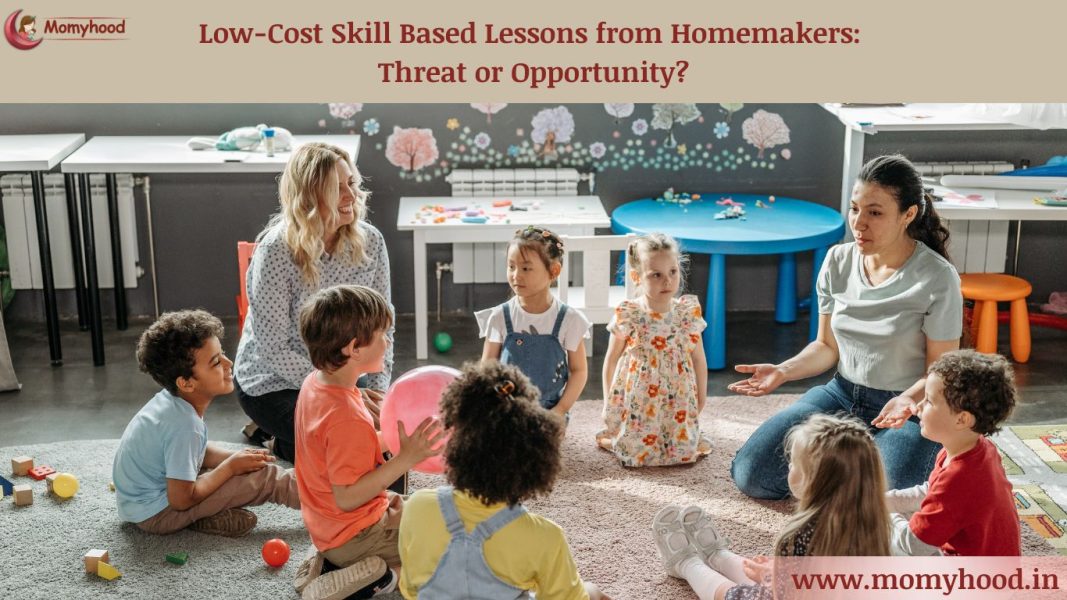Have you ever scrolled through social media and stumbled upon a comment that made you stop and think? Recently, I came across one such comment on a post discussing the pricing of children’s skill classes. The comment critiqued homemakers offering Affordable Skill-Based Classes by Homemakers at affordable rates, lamenting the impacts on experienced teachers.
The actual comment;
“The only problem is that nowadays every homemaker has started teaching…that too at such low cost… n we who are so experienced are ultimately suffering… parents should also understand the difference between a Trained and experienced person and an unskilled person…”
Contents
Double Standard on “Fair” Pricing
Let’s break it down. Selling unwanted items at discounted prices or hosting moving out sales is widely accepted, right? It’s a way to clear space, make a little cash, or increase accessibility for financially constrained groups. But why does offering Affordable Skill-Based Classes by Homemakers spark controversy? Shouldn’t we see it as making valuable knowledge more accessible, just like promoted sales do for physical goods?
Judging Credentials Over Competence
Status assumptions manifest when a homemaker offers budget lessons and gets labelled as under-qualified competition. But where does this bias originate? Society automatically presumes homemakers have skills of lesser worth than formally credentialed teachers charging higher rates. However, competence exists irrespective of qualifications.
We must challenge notions that homemakers betray industry standards by making classes affordable to lower-income groups. Just as discounted second-hand goods carry usefulness for different segments, so does budget education. If Affordable Skill-Based Classes by Homemakers deliver satisfactory teaching quality, who are we to undermine its value for underserved parents based solely on pricing?
Moreover, it’s important to acknowledge the journey of homemakers who choose to pursue teaching opportunities. Many homemakers have dedicated years to caring for their families, and they may be seeking ways to rebuild their careers and contribute financially. It’s possible that they faced challenges in achieving their career goals earlier on, and now, after much reflection, they’re bravely stepping into the teaching arena to share their skills and knowledge. Let’s approach this issue with compassion and understanding, recognizing the courage it takes for homemakers to make this transition and the unique hurdles they may encounter along the way. Because Affordable Skill-Based Classes by Homemakers are a courageous step forward.
Assessing Teaching Quality Objectively
Rather than making assumptions about the competency levels of homemakers, shouldn’t we judge the value and fairness of their teaching based on the quality outcomes and satisfaction feedback from the parents and students who partake in their classes?
The Diversity of Skills and Talents
Here’s the thing: homemakers aren’t just homemakers. They’re talented individuals with skills and knowledge worth recognizing. So why do we dismiss their expertise simply because of their domestic role?
If an expert teacher charges Rs. 250 per class for any skill, parents accept children learning little because the teacher has impressive credentials. Yet if a homemaker lacking credentials charges Rs. 150 per class and parents express satisfaction, it raises accusations of exploiting parents’ lack of discernment. This reaction reveals underlying assumptions – that homemakers offer lesser quality due to lower prices and domestic roles. But is that a fair judgement? We don’t assume used goods sellers are unskilled just because items are discounted. So why apply a different rubric to Affordable Skill-Based Classes by Homemakers?
We should not see affordable classes as stealing from expensive teachers. They actually grow the market bigger. Think of the market as a pie. Expensive teachers have one slice. Budget classes make the pie larger – they bring in new customers. Now there are more slices for everyone.
Uber example. Before Uber, some people could not afford taxis. Uber gave them affordable rides. The taxi and ride market got much bigger. Same with classes. Homemakers offer cheaper prices. Now more kids can join classes. It is good for kids, parents and all teachers. There is space for expensive teachers and budget homemakers. They can work together to help more students, not compete. The pie is expanding, not splitting.
We should think win-win. Affordable classes make the teaching market bigger. They help bring education to more children. This is the best way to see it.
Moreover, is it justified branding homemakers as inherently “unskilled”? Shouldn’t skills be assessed individually instead of imposing background-based limitations? Just because someone is charging less does not necessarily mean they are less competent.
Ultimately, shouldn’t parents have autonomy deciding what fulfills their child’s needs balanced with household budget realities? If parents are satisfied with class quality from homemakers and the rates work for them, external parties should withhold judgement.
Progress Through Open Dialogue
The original comment made fair critiques but the tone felt hurtful towards homemakers and their skills. Constructive dialogue is key. Expert teachers and homemaker educators can understand each other’s experiences through open and empathetic discussion. We all play a role in making quality skills education accessible. Working cooperatively, not competitively, provides the chance to craft ethical solutions that validate multiple perspectives. There is space to fairly rethink business norms while supporting inclusion.
Conclusion
The key is that the teaching “pie” can get bigger, not just split. There’s room for teachers at all prices. Affordable Skill-Based Classes by Homemakers can bring quality education to more children by making it financially accessible to more parents. Rather than seeing this as a zero-sum game of competition, we have an opportunity to expand the entire market and mindset around teaching.
Working cooperatively, with empathy and open communication, expert teachers and homemaker educators can find common ground. We must challenge assumptions that affordable cost equals inferior quality or unfair business tactics. Judging the competence and value of any teacher should emphasize merit-based factors – their teaching skills, content knowledge, student outcomes and parent reviews.
By coming together around our shared mission to enrich young minds, instead of infighting over margins and credentials, we empower more talents while making quality education inclusive. Rethinking notions of fairness and expertise is vital so we distribute dignity and respect to all teachers motivated to spread knowledge.
Our perceptions shape reality. So I invite you to join me in evolving perspectives towards empowerment, accessibility and nurturing all willing educators. Progress lies not in safeguarding the status quo, but uplifting diverse contributions to expand the solutions pie for underserved communities. The teaching market can keep growing – let’s give a chance for all dedicated teachers to be change-makers.
Related post: 20 Best Online Courses for Housewives to Earn Money!
Note from the Blog Owner:
It’s Women’s Month! I’d love to use my platform to promote and uplift women entrepreneurs. If you have a business you’d like me to feature, please share your journey with me through DM on my Instagram.
And if you’re looking to bring more mindfulness and joy into your parenting, join the Manifesting Parenting Bliss WhatsApp channel to get daily inspiration right on your phone. Unlock the secrets to peaceful, intentional parenting by clicking here to join now.
Your comments and shares do more than just support our blog—they uplift the amazing moms who share their stories here. Please scroll down to the end of the page to leave your thoughts, and use the buttons just below this line to share. Your support makes a big difference!



